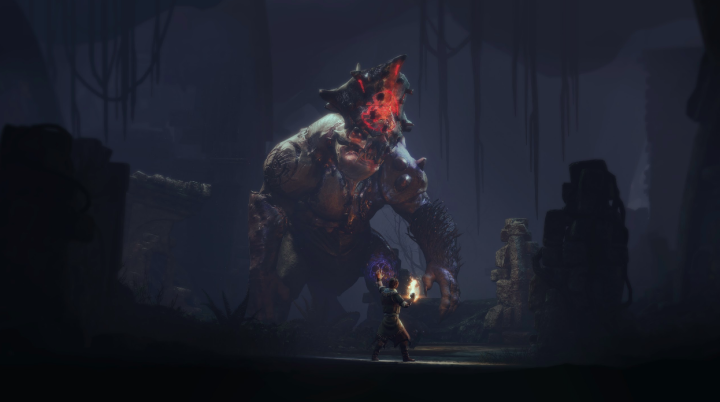
The elevator pitch for Xaviant’s Lichdom: Battlemage probably goes something like this: “It’s Borderlands 2 meets Dark Souls.” Even in the early form that we saw in a Game Developer’s Conference demo session, and a subsequent look at the currently available Steam Early Access release, Lichdom‘s got both the hooks and the looks. It’s fundamentally a first-person shooter, only your firearms are literal fiery arms… and icy arms, and more besides.
You’re a mage, and a badass mage at that. There are no cooldowns, no mana, no gates of any kind that force your magic-wielding warrior to rely on anything other than his or her innate abilities. Even with virtual reality, eye tracking madness, and other shiny baubles to distract the senses at GDC, there’s a freshness in the design and execution of Lichdom that left us excited to talk about it in the days after the show.
Story/Concept

Question marks. We know a lot about the structure of Lichdom‘s gameplay systems (more on that below), but the story and the world built around it remains a mystery. Xaviant is discussing a few high-level concepts, but none of the actual plot specifics. You’ll start out – in the final game, not the current Early Access build – by choosing your sorcerer’s gender. While the gameplay and general course of the plot remain largely the same regardless of which choice you make, each character’s motivations differ.
The male Battlemage, voiced by Troy Baker (Joel from The Last of Us) is out to avenge the death of his wife, while the female Battlemage, voiced by prolific voice actor Jennifer Hale (FemShep in the Mass Effect series), is on a quest to save her kidnapped sister. Xaviant hired separate writers to craft the dialogue for each character – the one you don’t choose appears in the game as a sort of NPC guide – even going as far as getting male and female scribes for each part, to better capture each character’s voice.
Early access. It’s unusual to see a story-driven game like this one go the Steam Early Access route (it’s available right now, in fact), but Xaviant sees benefits in exposing Lichdom‘s gameplay systems and user interface to players early. The long-term goal is to deliver the finished product as a roughly 30-hour adventure spread across multiple linear levels, with a New Game+ mode that offers more freedom to play around with endgame content. Lichdom will be PC-only to start, but Xaviant is looking into opportunities on other platforms (there’s already gamepad support in the Early Access release).
Gameplay

First-person spell-slinger. The heart of Lichdom is its spell system, which breaks up your chosen hero’s casting across different elemental categories. Regardless of the element you’ve got equipped – we saw fire, ice, and corruption (a nifty take on damage over time that lets you “infect” enemies with other spell effects, like fire or ice) – you’ve got two basic ranged attacks: a standard “bolt”-style casting (think: fireballs) and an area-effect attack that damages all enemies in the targeted area. Both of these can also be charged up for greater damage by holding the casting button down.
The real game-changer, however, is your Battlemage’s dodge move. Xaviant’s vision for Lichdom is to deliver a game in which the mage isn’t always the “glass cannon” in the back, the fellow that’s capable of doing massive damage but then gets fragged if something dangerous so much as looks his way. With dodge, which you use by pressing the space bar while you’re moving in the desired direction, your quick dash ends in an area-effect explosion that damages whatever’s nearby with the spell you’ve got equipped.
The idea is that you’re dodging into a group of enemies to damage them, and then sprinting away and spinning around to keep hammering them with more spells. You’ve also got the ability to block, and it functions in a similar manner. Holding the block button down halves any damage that you take, but you can negate all damage and trigger an explosive spell blast (like a more powerful version of the dodge’s blast) if you press block just as the enemy attack lands.

Lichdom‘s action is all reflex-driven. It feels a little too forgiving at first, since your bolt attacks auto-target whatever’s in your crosshairs, but that turns out to be an illusion. The game is user-friendly, but it’s definitely not easy. Enemies have a tendency to spawn in force, and they’re aggressive about pursuing you. Let even a couple get too close, and they’ll quickly knock your health down to nothing. Lichdom‘s has a three-tier regenerating health system; if one meter empties all the way, it won’t refill until you find a recharge point. All of these factors add up to a stiff level of challenge that really forces you to think about every encounter.
You are made of magic. Lichdom features a loot system that is very much in the vein of Diablo or Borderlands, though with a big added focus on crafting. Loot drops are essentially color-coded (for rarity) components that you use to build more and more powerful spells. There aren’t any equipment drops in the traditional sense; everything you collect is used for crafting. A spell is broken into three basic components that determine the base element, the type of attack, and any additional effects. There are also Augments, that allow you to further enhance the spell you’re creating.
As with the loot-focused games that inspired the system, monkeying with Lichdom‘s crafting components impacts the created spell’s stats, covering everything from damage to duration to area of effect. The brief taste we’ve had of crafting speaks to a very complex system that fans of loot-grinding can easily obsess over. Xaviant is still building a lot of the visual identity for this and other systems. There may yet be a less stat-focused option for gamers that just want to go in and blast monsters with magic, but it’s not there yet.
Presentation

A CryEngine 3 fantasy. Lichdom is a looker. The small slice we’ve seen of its fantasy world, which is replete with undead minions of some (presumably) higher power, doesn’t immediately stand out from other high fantasy epics in terms of its overall style, but there’s a high level of polish. The crumbling stone ruins and shadow-covered forest press in from all sides. There’s definitely a video game-y quality to the linear, corridor-style layout – it’s all in service to the gameplay, clearly – but there’s definite care and attention being paid to giving the world a polished feel.
Other aspects of the presentation remain unfinished. If you fire up the Early Access game, you’re going to see temp names (and probably words) in the subtitles and no voice acting. That’s going to improve over time, as that’s the nature of this sort of release. But when you sit down to play Lichdom at present, you can definitely get a sense of where some of the design scaffolding is still in place.
Takeaway
There’s potential here. Tons of it. Xaviant is a newcomer developer filled out by a team of veterans – folks from studios like CCP Games, Bethesda Softworks, and Junction Point. It’s clear after playing Lichdom: Battlemage that the team has an understanding of the hooks that attract fans of lootfest RPGs. It’s also clear from the dev’s Early Access page on Steam that there’s a very specific plan in place, with dates and price points set for alpha, beta, and launch phases. Whether or not they can stick to that schedule and plant the landing remains to be seen, but there’s a whole lot of promise in what we’ve seen so far.
Editors' Recommendations
- Dark Souls servers are finally coming back online
- Twitch streamer uses dance pad to finish Dark Souls 3 with level 1 character


